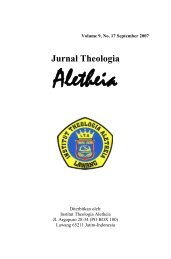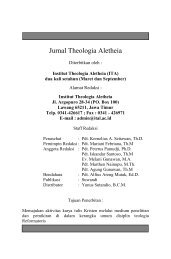download - Sekolah Tinggi Theologia Aletheia Lawang
download - Sekolah Tinggi Theologia Aletheia Lawang
download - Sekolah Tinggi Theologia Aletheia Lawang
Create successful ePaper yourself
Turn your PDF publications into a flip-book with our unique Google optimized e-Paper software.
63<br />
T<br />
Trust And Obedience From Calvin<br />
To The Second Reformation<br />
James A. De Jong<br />
rust and obedience are hallmarks of the theology of John<br />
Calvin. On the ―trust‖ side of the equation, the reformer of<br />
Geneva is credited with purging worship of such medieval<br />
accretions as saints days, relics, sacramentalism, unintelligible<br />
Latin, and ―implicit faith‖ in the power of the church unto<br />
salvation. He is praised for restoring true and clear preaching of<br />
the Word in an effort to elicit living faith—true trust--in the hearer.<br />
True trust is created through true religion. On the ―obedience‖ side<br />
of the equation, he is popularly accused of over-regulating<br />
Genevan life with statutes imposing a conformity to the gospel that<br />
amounted to legalism and invited hypocrisy. His battles with the<br />
antinomian and Libertine elements in the city are well documented.<br />
If he had his way theologically and morally in the various civic<br />
councils and the consistory, it was only for half his career, from the<br />
early 1550s until his death in 1564. For the first half of his<br />
reforming work, his preaching and teaching were openly and<br />
frequently resisted and his influence on civic life was tentative and<br />
partial. Yet, from his earliest writings in the 1536 Institutes of the<br />
Christian Religion, through his sermons, catechisms, and<br />
commentaries to the end of his life he maintained a consistent, if<br />
deepening, emphasis on true faith in the living Christ fed and<br />
nourished by the true and faithful preaching of the Word, as<br />
fortified by the pure administration of the holy sacraments. Trust<br />
in God the Creator, God the Redeemer, and God the Sanctifier—<br />
even in times of intellectual doubt and emotional despondence,<br />
both of which Calvin acknowledged as afflictions sometimes<br />
visited upon believers—was the essence of true religion for Calvin.<br />
Such trust yielded unwavering gratitude, which was displayed in<br />
the grateful living shaped by Calvin‘s new doctrine of the third use




